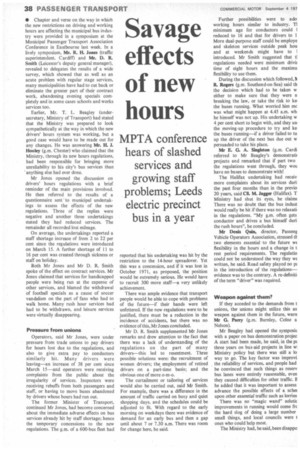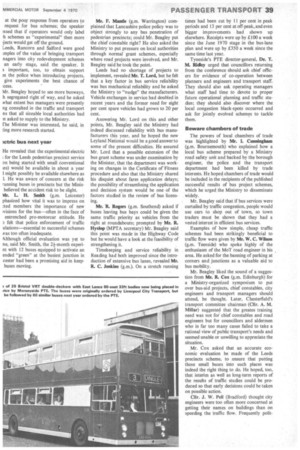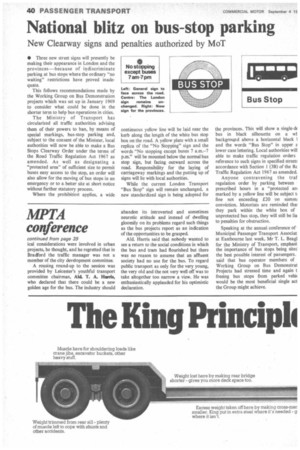Savage effects of new hours
Page 40

Page 41

Page 42

If you've noticed an error in this article please click here to report it so we can fix it.
MPTA conference hears of slashed services and growing staff problems; Leeds electric precinct bus in a year
• Chapter and verse on the way in which the new restrictions on driving and working hours are affecting the municipal bus industry were provided in a symposium at the Municipal Passenger Transport Association Conference in Eastbourne last week. In a lively symposium, Mr. R. H. Jones (traffic superintendent, Cardiff) and Mr. D. IL Smith (Leicester's deputy general manager), revealed to delegates the results of a wide survey, which showed that as well as an acute problem with regular stage services, many municipalities have had to cut back or eliminate the greater part of their contract work, abandoning evening specials completely and in some cases schools and works services too.
Earlier, Mr. T. L. Beagley (undersecretary, Ministry of Transport) had stated that the Ministry was prepared to look sympathetically at the way in which the new drivers' hours system was working, but a good case would have to be made out for any changes. He was answering Mr. H. J. Hooley (g.m. Chester) who claimed that the Ministry, through its new hours regulations, had been responsible for bringing more unreliability to his city's bus services than ' anything else had ever done.
Mr Jones opened the discussion on drivers' hours regulations with a brief reminder of the main provisions involved. He then referred to the results of a questionnaire sent ' to municipal undertakings • to assess the effects of the new regulations. Three of the replies were negative and another three undertakings stated they had reduced services. The remainder all recorded lost mileage.
On average, the undertakings reported a staff shortage increase of from 2 to 22 per cent since the regulations were introduced on March 15. A further shortage of 11 to 16 per cent was created through sickness or staff on holiday.
Both Mr Jones and Mr D. R. Smith spoke of the effect on contract services. Mr Jones claimed that services for handicapped people were being run at the expense of other services, and blamed the withdrawal of football specials as a cause of soccer vandalism on the part of fans who had to walk home. Many rush hour services had had to be withdrawn, and leisure services were virtually disappearing.
Pressure from unions Operators, said Mr Jones, were under pressure from trade unions to pay drivers for hours lost due to the regulations, and also to give extra pay to conductors similarly hit. Many drivers were leaving—an increase of 38 per cent since March 15—and operators were receiving complaints from the public about the irregularity of services. Inspectors were receiving rebuffs from both passengers and staff, or having to move buses abandoned by drivers whose hours had run out.
The former Minister of Transport, continued Mr Jones, had become concerned about the immediate adverse effects on bus services already hit by staff shortage; hence the temporary concessions to the new regulations, The g.m. of a 600-bus fleet had reported that his undertaking was hit by the restriction to the I4-hour spreadover. Yet this was a concession, and if it was lost in October 1971, as proposed, the position would be extremely serious. He would have to recruit 300 more staff—a very unlikely achievement There was ample evidence that transport people would be able to cope with problems of the future—if their hands were left unfettered. If the new regulations were to be justified, there must be a reduction in the incidence of accidents, but there was no evidence of this,Mr Jones concluded.
Mr D. R. Smith supplemented Mr Jones remarks and drew attention to the fact that there was a lack of understanding of the regulations on the part of many drivers—this led to resentment. Three possible solutions were: the recruitment of women drivers; the employment of retired drivers on a part-time basis; and the obvious one of more o-m-o.
The curtailment or tailoring of services would also be carried out, said Mr Smith. For example, there was a difference in the amount of traffic carried on busy and quiet shopping days, and the schedules could be adjusted to fit. With regard to the early morning on weekdays there was evidence of demand for an early bus and then a gap until about 7 or 7.30 a.m. There was room for change here, he said. Further possibilities were to ado working hours similar to industry_ Ti minimum age for conductors could I reduced to 16 and that for drivers to 1 More dual-purpose staff could be employe and skeleton services outside peak hou and at weekends might have to I introduced. Mr Smith suggested that ti regulations needed were minimum drivit time of eight hours and the rnaximu flexibility to use them.
During the discussion which followed, A IL Rogers (g.m. Southend-on-Sea) said th the decision which had to be taken w either to make sure that they were n breaking the law, or take the risk to ke the buses running. What worried him Inc was what might happen at 4.45 a.m. whi he himself was not up. His undertaking w 4 per cent short to begin with, and they us( the moving-up procedure to try and kel the buses running—if a driver failed to tu up the driver of the next bus due out w persuaded to take his place.
Mr E G. A. Singleton (g.m. Cardi referred to Mr Beagley's demonstrati4 projects and remarked that if part two the regulations went through, they wou have no buses to demonstrate with!
The Halifax undertaking had receiv more complaints about its services dud' the past four months than in the previo 20 years, said CB. M. Jagger (Halifax). T Ministry had shut its eyes, he clairnc There was no doubt that the bus indust would really be hit if there was no relaxatil in the regulations. "My g.m. often gets conductor and drives a bus himself duni the rush hours", he concluded.
Mr Denis Quin, director, Passeng Vehicle Operators Association, stressed th two elements essential to the future wc flexibility in the hours and a change in t rest period requirements. The regulatio could not be understood the way they wc written, he said: Road safety played no ix in the introduction of the regulations— evidence was to the contrary. A re-clefinitii of the term "driver" was required.
Weapon against them?
If they acceded to the demands from t unions, the unions might utilize this as weapon against them in the future, warn Mr G. Parry (g.m. Burnley, Colne a Nelson).
Mr Beagley had opened the symposiu with a paper on bus demonstration projec A start had been made, he said, in the cq three years on bus-aid projects in line wi Ministry policy but there was still a lo way to go. The key factor was improvi the reliability of services, and people had be convinced that such things as reserv bus lanes were entirely reasonable, even they caused difficulties for other traffic. E he added that it was important to assess advance the possible effects of a schet upon other essential traffic such as lorries There was no "magic wand" solutic improvements in running would come frc the hard slog of doing a large number small things, and local councils were t ones who could help most.
The Ministry had, he said, been disappo at the poor response from operators to request for bus schemes; the speaker :ssed that if operators would only label h schemes as "experimental" then more jects would get off the ground.
Leeds, Runcorn and Salford were good Imples of the value of bringing transport nagers into city redevelopment schemes an early stage, said the speaker. It s important, too, to obtain support m the police when introducing projects, give experiments the best chance of ;cess.
Beagley hoped to see more busways, h segregated right of way, and he asked what extent bus managers were presently ag consulted in the traffic and transport ns that all sizeable local authorities had ii asked to supply to the Ministry.
[he Minister was interested, he said, in ting more research started.
Cctric bus next year
He revealed that the experimental electric ; for the Leeds pedestrian precinct service cm being started with small conventional ;es) would be available in about a year might possibly be available elsewhere as 1. He was aware of concern at the risk running buses in precincts but the Minisbelieved the accident risk to be slight.
11r. L H. Smith (g.m. Leicester) phasized how vital it was to impress on ,Ited members the importance of new Ivisions for the bus—often in the face of entrenched pro-motorcar attitude. He ) felt that police enforcement of traffic ulations—essential to successful schemes was too often inadequate.
klthough official evaluation was yet to ne, said Mr. Smith, the 21-month experint with 12 buses equipped to activate an ended "green" at the busiest junction in center had been a promising aid in keepbuses moving.
Mr. F. Mande (g.m. Warrington) complained that Lancashire police policy was to object strongly to any bus penetration of pedestrian precincts; could Mr. Beagley put the chief constable right? He also asked the Ministry to put pressure on local authorities through normal grant schemes, especially where road projects were involved, and Mr. Beagley said he took the point.
Leeds had no shortage of projects to implement, revealed Mr. T. Lord, but he felt that a key factor in bus service reliability was bus mechanical reliability and he asked the Ministry to "nudge" the manufacturers. Vehicle exchanges in service had doubled in recent years and the former need for eight per cent spare vehicles had grown to 20 per cent.
Answering Mr. Lord on this and other points, Mr. Beagley said the Ministry had indeed discussed reliability with bus manufacturers this year, and he hoped the new Leyland National would be a good answerto some of the present difficulties. He assured Mr. Lord that a possible extension of the bus grant scheme was under examination by the Minister, that the department was working on changes in the Certificate or Fitness procedure and also that the Ministry shared his disquiet about fares application delays; the possibility of streamlining the application and decision system would be one of the factors studied in the review of bus licensing.
Mr. R. Rogers (g.m. Southend) asked if buses leaving bus bays could be given the same traffic priority as vehicles from the right at roundabouts; prompted by Mr. R. Hyslop (MPTA secretary) Mr. Beagley said this point was made in the Highway Code but be would have a look at the feasibility of strengthening it.
Timekeeping and service reliability in Reading had both improved since the introduction of extensive bus lanes, revealed Mr. R. C. Jenkins (g.m.). On a stretch running
times had been cut by 11 per cent in peak periods and 13 per cent at off-peak, and even bigger improvements had shown up elsewhere. Receipts were up by £100 a week since the June 1970 stage in the bus-lane plan and were up by £350 a week since the same time last year.
Tyneside's PTE director-general, Dr. T. M. Ridley urged that councillors returning from the conference should ask chief officers for evidence of co-operation between planners and engineers and transport staff. They should also ask operating managers what staff had time to devote to proper future operational planning and traffic studies; they should also discover where the local congestion black-spots occurred and ask for jointly evolved schemes to tackle them.
Beware chambers of trade The powers of local chambers of trade was highlighted by Mr. I. Cunninshim (g.m. Bournemouth) who explained how a local bus scheme prepared by a Ministry road safety unit and backed by the borough engineer, the police and the transport department had been killed by trade interests. He hoped chambers of trade would be included in the recipients of the published successful results of bus project schemes, which he urged the Ministry to disseminate widely.
Mr. Beagley said that if bus services were curtailed by traffic congestion, people would use cars to shop out of town, so town traders must be shown that they had a vested interest in efficient bus services.
Examples of how simple, cheap traffic schemes had been strikingly beneficial to traffic flow were given by Mr. W. C. Wilson (gin. Teesside) who spoke highly of the enthusiasm of the MoT road engineer in his , area. He asked for the banning of parking at corners and junctions as a valuable aid to bus mobility.
Mr. Beagley liked the sound of a suggestion from Mr. R. Cox (g.m. Edinburgh) for a Ministry-organized symposium to put over bus-aid projects, chief constables, city engineers and transport managers should attend, he thought. Later, Chesterfield's transport committee chairman (CUL A. M. Millar) suggested that the greates training need was not for chief constables and road engineers but for councillors and aldermen who in far too many cases failed to take a rational view of public transport's needs and seemed unable or unwilling to appreciate the situation.
Mr. Cox asked that an accurate economic evaluation be made of the Leeds precincts scheme, to ensure that putting these small buses into such places was indeed the right thing to do. He hoped, too, that interim as well as long-term reports of the results of traffic studies could be produced so that early decisions could be taken on possible action.
Cllr. J. W. Pell (Bradford) thought city engineers were too often more concerned at getting their names on buildings than on speeding the traffic flow. Frequently polit ical considerations were involved in urban projects, he thought, and he regretted that in Bradford the traffic manager was not a member of the city development committee.
A rousing round-up to the session was provided by Leicester's youthful transport committee chairman, Aid. T. A. Harris, who declared that there could be a new golden age for the bus. The industry should
abandon its introverted and sometimes neurotic attitude and instead of dwelling gloomily on its problems regard such things as the bus projects report as an indication of the opportunities to be grasped.
Aid. Harris said that nobody wanted to see a return to the social conditions in which the bus and tram had flourished but there was no reason to assume that an affluent society had no use for the bus. To regard public transport as only for the very young, the very old and the not very well off was to take altogether too narrow a view. He was enthusiastically applauded for his optimistic declaration.




























































































































